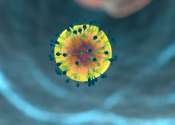Why do people respond differently to the same drug?
Scientists at Scripps Research have comprehensively mapped how a key class of proteins within cells regulates signals coming in from cell surface receptors.
Oct 2, 2020
0
58
Scientists at Scripps Research have comprehensively mapped how a key class of proteins within cells regulates signals coming in from cell surface receptors.
Oct 2, 2020
0
58

Scientists have demonstrated a new way to precisely target cells by distinguishing them from neighboring cells that look quite similar.
Aug 20, 2020
0
308

A new study from the University of Notre Dame shows drugs used to treat high cholesterol could interfere with the way breast cancer cells adapt to the microenvironment in the brain, preventing the cancer from taking hold. ...
Jun 17, 2020
0
125

Duke University researchers have developed a synthetic molecule that selectively dampen the physiological rewards of cocaine in mice. It also may represent a new class of drugs that could be more specific with fewer side ...
May 28, 2020
0
202

Cancer cells remain clumped together via a sort of 'Velcro' which allows them to adhere to each other wherever they appear. In order for cancer cells to leave a tumour and spread throughout the body during metastatic processes, ...
May 13, 2020
0
1

The next time a tick feeds on you, Washington State University researchers hope to make sure persistent arthritis caused by Lyme disease doesn't linger for a lifetime.
Apr 30, 2020
0
813

A new study in Neuron offers clues to why autism spectrum disorder (ASD) is more common in boys than in girls. National Institutes of Health scientists found that a single amino acid change in the NLGN4 gene, which has been ...
Apr 2, 2020
0
210

Researchers from Tokyo Medical and Dental University (TMDU) discover a novel mechanism by which claudin-1 contributes to the progression of tongue squamous cell carcinoma
Mar 3, 2020
0
1

In an article published recently in Microgravity, a Nature journal, researchers at Rensselaer Polytechnic Institute demonstrate a unique method for studying the mechanisms behind the formation of amyloid fibrils associated ...
Jan 28, 2020
0
242

Immune checkpoints are surface proteins that cancer cells use to evade immune response. These surface proteins are critical for cancer cell growth and drugs targeting these proteins have revolutionized the management of patients ...
Jan 2, 2020
0
331
